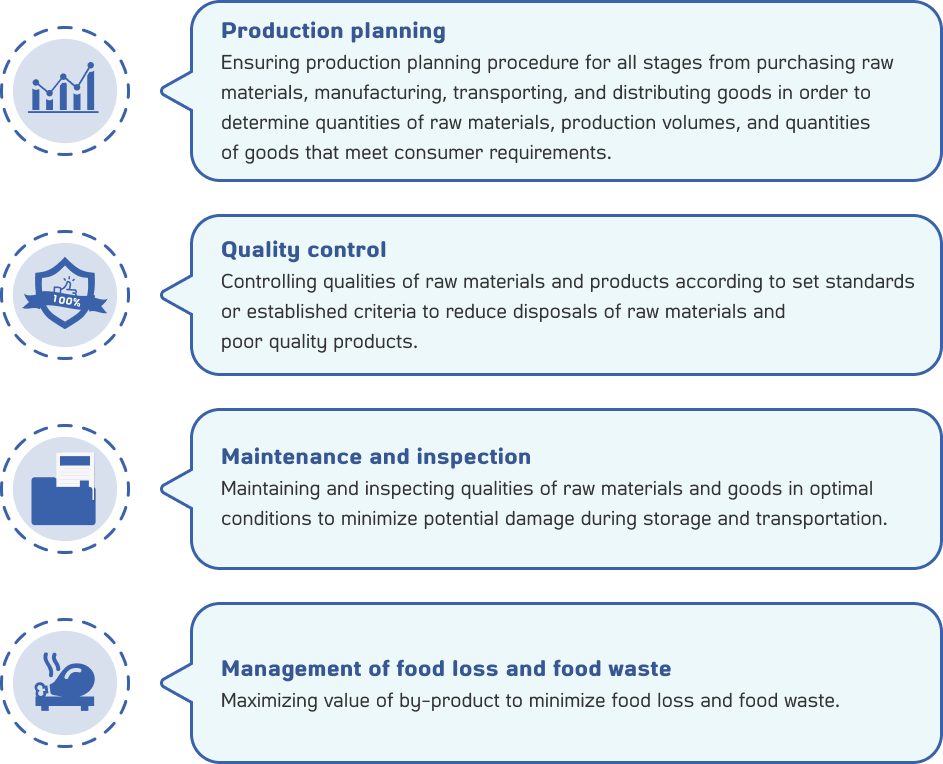- We collaborate with government agencies, the private sector, the civil society and other stakeholders to enhance our management of environmental impacts at the Company as well as the industry levels. This also helps us prevent possible conflicts with communities and other stakeholders.
Performance
We have set the targets to reduce greenhouse gas emissions, energy consumption, waste to landfill and incineration, and water withdrawal. We aim to achieve this through energy conservation and energy efficiency projects and an increase in the proportion of renewable energy, together with improvement, transformation and valorization of waste and wastewater in order to reduce emissions throughout the value chain. In addition to effective management throughout the production process, we also focus on developing “Sustainable Products” to encourage participation from customers and consumers in mitigating environmental impacts. We also put our efforts in protecting biodiversity through projects to conserve and restore mangrove forests and watershed forests.
We promote energy efficiency, increase the use of renewable energy and support the management and valorization of waste/wastewater in our feed, farm-processing, and food business in order to reduce greenhouse gas emissions. At the same time, we also promote the increase in green areas in our operations to help absorb carbon dioxide.
The Company has introduced and implemented the Food Loss and Food Waste Policy with goals and operating guidelines as follows:
Principles:
1. Consolidate data on food loss, surplus food and food waste in accordance with Food Loss & Waste Protocol
started a research study to develop a program which aimed to measure food loss, using the data collection guidelines introduced by the Food and Agriculture Organization (FAO). The main objectives of the program are to assess food loss and identify measures to reduce loss throughout the entire value chain. A pilot project was conducted with fresh chicken meat and egg products to find the critical point of food loss (Hotspot) which has led to the development of the projects that will prevent and reduce food loss.
2. Reduce food loss, surplus food and food waste under the management framework as follows:

3. Promote recovering of food loss, surplus food and food waste as alternative uses based on the principle of circular economy and the food safety standards, which offers benefits to society, and reduces environmental impact and climate change.
4. Raise awareness and promote sustainable consumption and production in order to reduce food loss, surplus food and food waste among the stakeholders including customers, business partners, employees and farmers through collaborating and partnership projects, communication, education and campaigns.
Water resources are significant to the continuing operations of integrated agro-industrial and food business. Moreover, The Company is very perceptive of intensified droughts that occur frequently. We, therefore, focus on selecting locations of new business establishments on the basis of basic utility risk management which should go in tandem with water efficiency. In addition the design of production processes and machines needs to consider on the balance of production efficiency with the effectiveness of use of water resources.
We emphasize appropriate water use at every process and manage data on water consumption for the analysis and planning of water management. We invest in research and development and utilize modern technology throughout our production process to help reduce water consumption and optimize water use, especially in our farm business which is the most water-intensive.
We strives to improve the production processes by taking into consideration optimal use of water resources and reduction of wastewater. The wastewater treatment system has been designed to circulate treated water for recycle. Moreover, the quality of treated wastewater is constantly monitored and tested by laboratory registered under the Department of Industrial Works in order to maintain and improve the quality of effluent based on the standards set by the relevant laws before releasing the effluent.
We recognizes the importance of water resource which as a key factor for living. Therefore, The Company has carried out a wide range of projects in collaboration with stakeholders to conserve watershed forests, maintain water sources, and improve community access to water resources
Recognizing the importance of effective waste management in preventing impacts on the communities and the environment, we focus on optimizing our resource use, complying with the management standards and valorizing waste from our production process.





